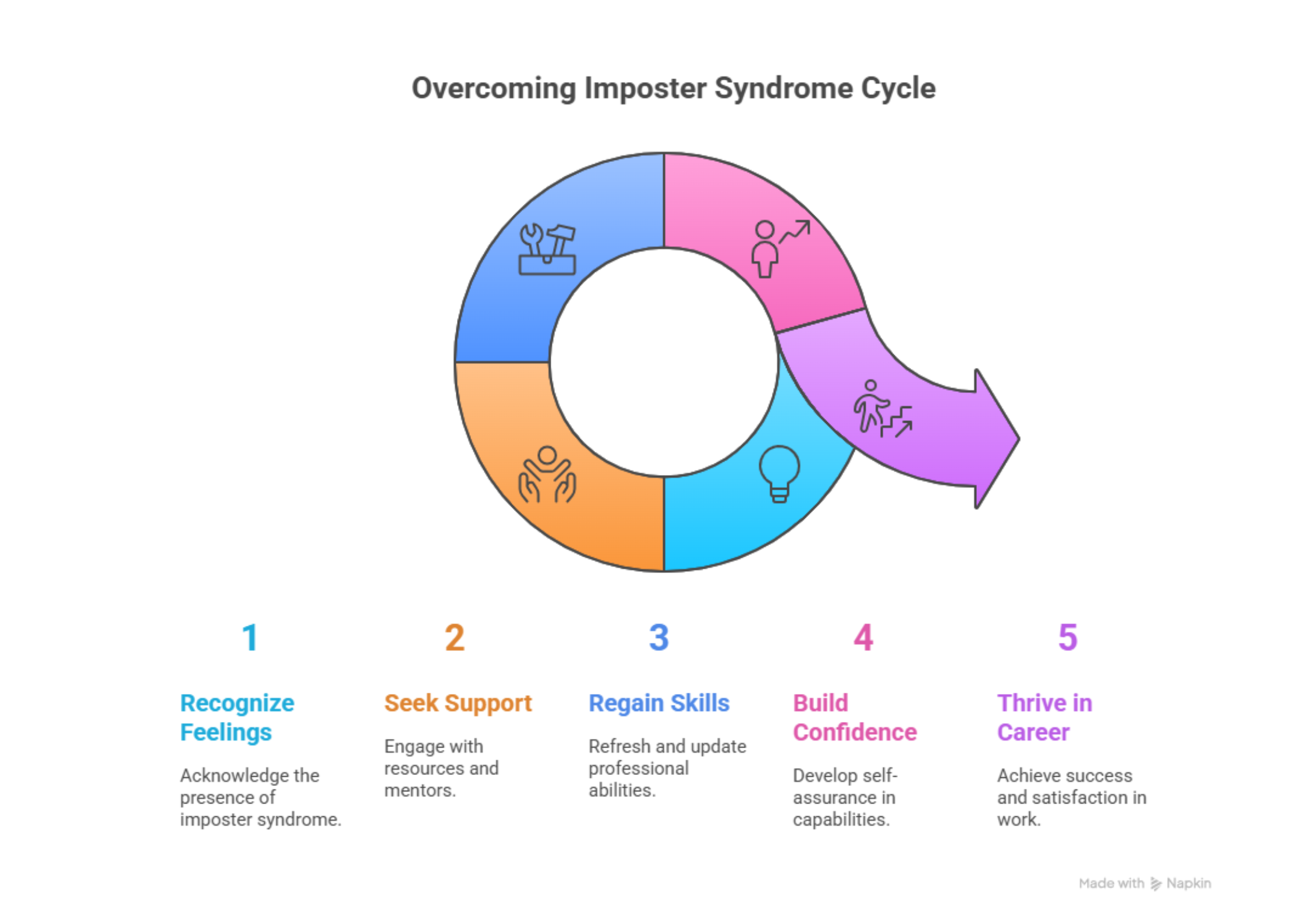
Have you ever looked around at your colleagues and wondered how they all seem so confident? If so, you’re certainly not alone. A recent 2025 meta-analysis covering 30 studies and over 11,000 individuals found that around 62% of people experience imposter syndrome or related feelings — such as a persistent fear of being exposed as a fraud, even in the face of clear evidence of success.
What Is Imposter Syndrome?
Imposter syndrome (IS), sometimes called the “imposter phenomenon,” is a psychological pattern where people attribute their achievements to luck or error, rather than their own ability or effort. Despite clear evidence of competence, individuals with IS may feel anxious, undeserving, or fraudulent — particularly in high-pressure or unfamiliar environments.
These feelings are especially common during times of change — such as starting a new job, switching careers, or returning from a career break. And because imposter syndrome is often unspoken, it can be isolating. Many people assume they’re the only one feeling this way, which makes it even harder to reach out for support.
Left unaddressed, imposter syndrome can manifest in damaging ways:
- Turning down opportunities like promotions or leadership roles
- Overworking in an effort to “prove” worth
- Avoiding tasks due to fear of failure or not measuring up
- Long-term mental health challenges, including chronic stress, burnout, anxiety, and depression
Although the term was first introduced in 1978 in reference to high-achieving women, research now shows that imposter syndrome affects people across genders and backgrounds — particularly those working in high-performance environments like healthcare, academia, research, and technology.
Five subtypes of imposter syndrome
Understanding how imposter syndrome can present itself is an important first step in overcoming it. Research has identified five common subtypes:
- The Perfectionist – Believes anything short of perfection equals failure
- The Natural Genius – Judges competence by ease; if something feels hard, they think they’re failing
- The Superhero – Measures success by how much they can juggle; anything less is falling short
- The Expert – Feels like a fraud unless they know everything; fears being “found out”
- The Soloist – Believes asking for help means they’re not capable
Recognising these patterns can help break the cycle of self-doubt and unrealistic expectations.
Why it matters to our fellows
At the Daphne Jackson Trust, we see imposter syndrome frequently among those returning to research after a career break. Many of our Fellows report feeling they need to “make up for lost time” or worry they’re behind their peers.
As one former Fellow, Dr Samantha Garrard, puts it:
“I think that returning can cause a feeling of imposter syndrome, and there is a strong sense that you need to catch up on all the years you’ve missed.”
Common concerns among returners include:
- Feeling out of practice – especially as technologies and practices evolve
- Comparing themselves to peers – and fearing they’ll be perceived as less committed
- Loss of confidence – simply from being away from the professional environment
How the Daphne Jackson Trust supports returners
Our fellowships are specifically designed to support individuals who are returning to research after a break, and we recognise that rebuilding confidence is just as important as retraining. We provide:
- Retraining opportunities – through both core Daphne Jackson training and discipline-specific skills development
- Dedicated Fellowship Advisors – who guide, encourage and champion returners throughout the Fellowship journey
- A supportive peer network – connecting fellows with others who understand the unique challenges and triumphs of returning to research
Our support goes far beyond technical training. As shown in our 2021 Impact Report:
- 9 out of 10 fellows reported increased confidence
- 84% said their fellowship improved their job prospects
- 10 (now 11!) former Daphne Jackson Fellows are now Professors – a rate five times higher than the national average
Final thoughts
Imposter syndrome is far more common than many realise, especially among those re-entering the workforce after a break. But these feelings don’t have to define your journey. With the right support, returners can overcome self-doubt and thrive — regaining not only their skills, but also their sense of belonging and belief in their own capabilities.



